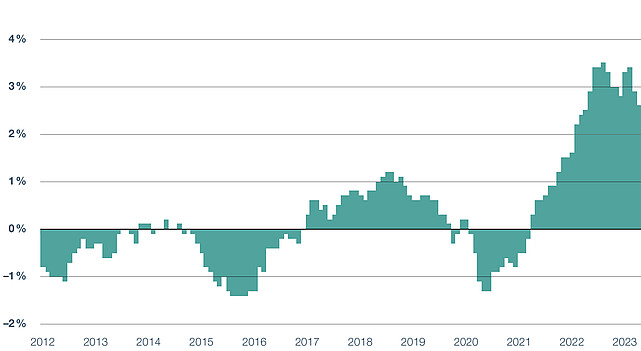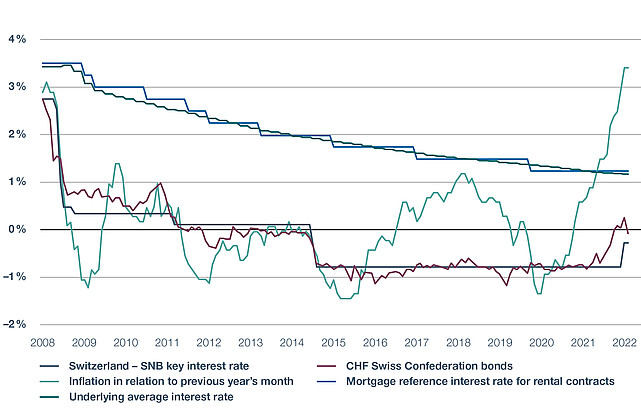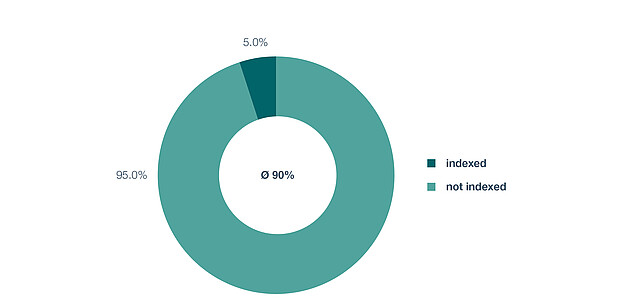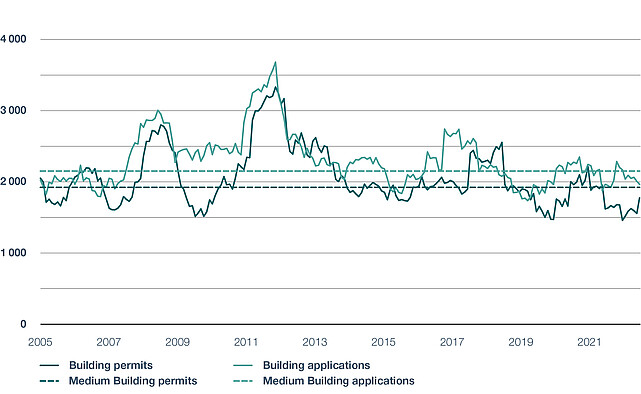“Faster, Higher, Stronger”, or “citius, altius, fortius” in Latin – this is the Olympic motto. And we can certainly ascribe Olympian qualities to commercial rental contracts. They contain more comprehensive and ambitious conditions than the standard rental contracts for residential properties. In particular, the fast and extensive adjustment of rents to inflation seems to be setting a record in these times of rising inflation.
Faster – ongoing adjustment to the national consumer price index
In most cases, the rents payable under commercial rental contracts can be fully adjusted to the changes in inflation. As a rule, rents are adjusted annually to the changes in the Swiss consumer price index. This index is updated on an ongoing basis according to the monthly inflation rates. Thus there is practically no lag in the adjustment of commercial rents, which is particularly relevant when inflation is rising strongly, as has been the case for the past year or so.
Changes compared to previous year
The situation is different for residential rental contracts. Under these contracts, changes in rent depend on the development of the reference interest rate and the maintenance and operating costs, and only partly on changes in inflation. The reference interest rate is based on the average mortgage rate charged by the banks, and is published once a quarter. Its effect is therefore delayed.
Reference interest rate in relation to key interest rate, 10-year Swiss confederation bonds and inflation
Higher – extensive adjustment to inflation
As a rule, rents payable under contracts for commercial space suitable for storage, logistics, industrial, production or office use are fully linked to changes in the national consumer price index. However, this adjustment method may only be applied to rental relationships that cannot be terminated by the tenant for the first five years. The system therefore limits the extent to which the adjustment can be applied. The adjustment to inflation weighted by rental income for a portfolio consisting primarily of commercial properties is usually around 80% to 90%.
Using the SF Commercial Properties Fund as an example, the following graph shows that 95% of all rental contracts are indexed, and that the portfolio's weighted indexation is 90%.
In addition, the adjusted rents may never fall below the basic rent charged at the beginning of the rental relationship. This hedge is relevant when the national consumer price index is falling, and makes sure that the landlord of commercial property will always earn the originally agreed income.
Rents payable under standard contracts for residential property are usually adjusted in accordance with the development of the reference interest rate, the general increase in maintenance and operating costs, and partly also to inflation. If the reference interest rate rises by 0.25%, rents may be increased by 3%. As the general increase in costs must be proved by way of a complicated comparative calculation, some cantons allow a flat-rate increase of 0.5% per year. 40% of inflation according to the changes to the national consumer price index can be passed on to tenants.
Stronger – more comprehensive rental conditions
Commercial rental contracts govern a wider range of topics between landlords and tenants. For example, the contract can include agreements regarding maintenance and upkeep, conditions for rental adjustments and contract renewals, and even the return of the rental property. This makes the situation more predictable for landlords and ensures greater stability of income.
Tenants often make specific improvements to suit their individual requirements. Such investments strengthen their commitment to the rental space, and often lead to very long rental relationships. Commercial rental contracts are therefore usually concluded for a fixed term of at least five years.
Robust economy
The Swiss economy has proved to be robust and dynamic. The signs are good that Switzerland will escape a recession. Inflation was 2.8% in 2022, Swiss economic output grew by 2.0%, and the KOF Economic Barometer rose for the third month running in February 2023. Unemployment is historically low, and GDP increased by 1.2%.
In this good economic environment, demand for commercial space is brisk. Construction activity in the office sector has also lagged behind the historic average for some time now. The limited supply and good demand are boosting the letting of commercial space and adding to the stability offered by the advantages of commercial rental contracts outlined above.
Building permits and applications, 12-month rolling totals, in CHF mn
Commercial rental contracts not only offer landlords and also investors in vehicles focusing on commercial use an attractive return, but also a high degree of stability thanks to strong rental relationships and the extensive adjustment of rental income to inflation.
“A portfolio such as that of SF Commercial Properties Fund with a clear focus on commercial property definitely has Olympian qualities, as evidenced by the option of adjusting 90% of rents to inflation and the weighted fixed term of rental relationships of more than five years,” says Hans-Peter Wasser, Portfolio Manager Real Estate Direct at Swiss Finance & Property Funds Ltd.
For these reasons, investors would certainly be well advised to consider increasing their exposure to the commercial real estate sector, in particular when inflation is high. In keeping with the new motto adopted in 2021, “Faster, Higher, Stronger – Together”, the Swiss Finance & Property Group supports investors in all aspects of professional real estate investment.




